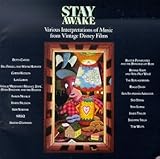|
Frank E. Churchill
Composer, Pianist/Keyboardist, Music Director
(1901 - 1942)
|
|

|
|
|
Frank E. Churchill was born in Maine and studied medicine at the University of California. He gave up his studies to become a theater pianist until he joined the Walt Disney organization as a composer in 1930, eventually replacing Carl Stalling as music director. In an interview with Disney film director Wilfred Jackson, conducted by David Johnson in 1988, Churchill is remembered as an accomplished pianist with an interest in classical music and a composer who was naturally talented and adaptable. He’s also fondly remembered as an easy-going prankster.
In the early years Disney established his own music staff because he couldn’t afford the royalty expenses of using copyrighted songs. He also wanted the music to be inextricably woven into the story. In 1933 Churchill wrote the music for one of Disney’s “Silly Symphonies,” the Academy-Award winning Three Little Pigs. The song from the cartoon, with a lyric by Ann Ronell, became a universal hit, “Who’s Afraid of the Big Bad Wolf?” Its cheerful nature appealed to a nation reeling from the Depression. Its success set a precedent for Disney movies which have continued to produce songs that have sustained public interest apart from the films. The Tortoise and the Hare, for which Churchill also wrote the music, won another Oscar for Best Short Subject in 1935.
In 1937 Disney presented his first feature-length cartoon, Snow White and the Seven Dwarfs, which was nominated for a Best Score Oscar. The eight songs that Churchill and lyricist Larry Morey wrote for the film included “Whistle While You Work,” “Heigh Ho,” “With a Smile and a Song,” “I’m Wishing,” and the song that Miles Davis made into a jazz standard, “Someday My Prince Will Come.” Snow White and the Seven Dwarfs was the first actual soundtrack ever issued since film music was re-recorded for release to the public prior to then.
Dumbo, released in 1941, won the Oscar for Best Original Music Score, written by Churchill and Oliver Wallace, and received a Best Song nomination for “Baby Mine” which Churchill wrote with lyricist Ned Washington. Churchill was then given the task of scoring Bambi which was released in 1942. Before he completed the score, however, he committed suicide, and the score was finalized by Edward Plumb and staff composers/arrangers. Both the score and the song that he wrote with Morey, “Love Is a Song,” were nominated for Oscars.
- Sandra Burlingame |
|
|
|


